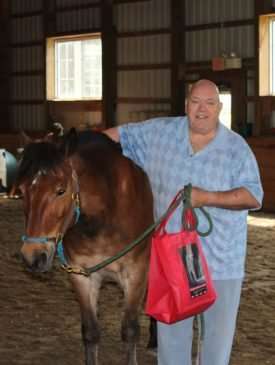Study examines how therapy horses are affected when helping others

Animal therapy helps people to relax, but how do the animals feel about it? A Rutgers University-New Brunswick study finds that horses don't mind working as part of therapy for traumatized veterans.
The small pilot study by Rutgers' Equine Science Center, which appeared in the Journal of Equine Veterinary Science, included nine horses and seven military veterans diagnosed with post-traumatic stress disorder (PTSD).
For five days, while the veterans interacted with the horses, researchers monitored the animals' heart rates and took blood samples. They examined the samples for specific markers, particularly oxytocin, which is known as the "happiness hormone," and cortisol, a hormone related to stress.
"To our knowledge, this is the first report of the measurement of oxytocin in horses used in equine-assisted activities and therapies (EAAT)," said Karyn Malinowski, the center's director. "If the concentration of this hormone increased during the trial, we would be able to suggest a positive correlation between EAAT and the overall 'happiness' of the horses."
The study showed a reduction in heart rate in the horses and no changes in the levels of cortisol or oxytocin, suggesting the animals suffered no stress from the therapeutic interactions with the veterans.
The veterans who interacted with the horses also reported a significant decrease in anxiety and depression along with other symptoms of psychological distress and PTSD.
That was the case for Walter Cooper, a Vietnam veteran, who worked with a therapy horse named Titan.
"Any time I spent with Titan during the project was my favorite moment because he seems to understand the issues I have," says Cooper.
Malinowski recommended further research with a larger number of horses, and a potentially longer time frame, to study the long-term impact of EAAT on horses. She wants to add heart rate measurements and blood sampling to the human side to better evaluate the interactions between horses and humans.
More information: Karyn Malinowski et al. The Effects of Equine Assisted Therapy on Plasma Cortisol and Oxytocin Concentrations and Heart Rate Variability in Horses and Measures of Symptoms of Post-Traumatic Stress Disorder in Veterans, Journal of Equine Veterinary Science (2018). DOI: 10.1016/j.jevs.2018.01.011
Provided by Rutgers University



















